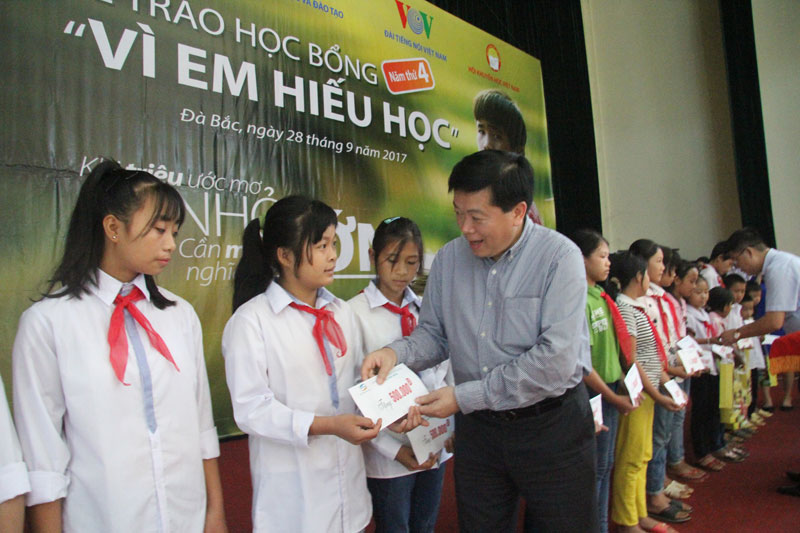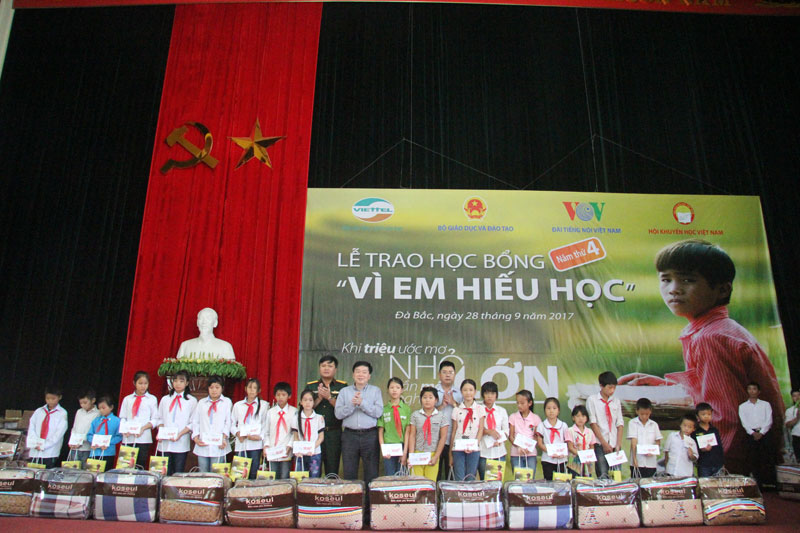
(HBO) – The Hoa Binh branch of the military-run telecommunication company Viettel Group on September 29 presented 170 scholarship from the programme "For Studious Children” to 170 needy students in 17 extremely poor communes in Da Bac district of Hoa Binh. Each scholarship was valued at 1 million VND, including 500,000 VND in cash and 500,000 VND worth in kind. Nguyen Van Chuong, Vice Chairman of the provincial People’s Committee attended the event.
The
scholarships were part of a programme to offer 990 scholarships worth 990
million VND launched by Viettel Hoa Binh targeting 99 communes in 10 districts
of Hoa Binh. In 2017, the programme will present the scholarships to 10 poor
children with good academic performance in each commune.
The
"For Studious Children” programme of Viettel Hoa Binh has been implemented with
the coordination of the Hoa Binh Department of Education and Training, the Hoa
Binh Fund for Study Encouragement. 2017 is the fourth year it has been carried
out in Hoa Binh (2014-2017).
Viettel
Hoa Binh has presented 3,840 scholarships valued at 3.84 billion VND to local
students as part of its commitment to support poor children in the province in 10
years until 2020 with total aid of nearly 10 billion VND.

Vice Chairman of the provincial People’s Committee Nguyen
Van Chuong presents "For Studious Children” scholarships to students in Da Bac
district.
Along
with presenting scholarships, Viettel Hoa Binh will continue conducting other
programmes such as bringing broad-band Internet connection to all schools and
educational facilities in the province, along with solutions and applications
as comprehensive management tools for schools and training establishments.

Leaders of the province, local departments and
localities as well as Viettel Hoa Binh representatives give presents to
students of Da Bac district.
According
to a representative from Viettel Hoa Binh, through the "For Studious Students”
programme, the firm affirms its business philosophy of upholding social
responsibility and its policy of "investing in education means investing in the
country’s future”.
The Standing Board of the Hoa Binh provincial Party Committee has agreed in principle on a proposal by the Standing Board of the Party Committee of Hoa Binh city to gather feedback on the city’s 1:2000 zoning plan, which forms part of its broader urban development strategy.
Hoa Binh province has made notable progress in public administration reform and digital government development, with the satisfaction index among citizens and businesses reaching over 84%, according to recent government evaluations.
Thanks to great efforts by local authorities in recent times, the governance and public administration performance of Mai Chau district has been significantly improved.
In the afternoon of June 6, the Party Committee, the People's Council, the People's Committee and the Fatherland Front of Lac Son district solemnly held a meeting to celebrate the 139th anniversary of the district's founding (1886–2025) and the 79th anniversary of the establishment of the district's Party Committee (1946–2025). There was the attendance of Mr. Bui Van Thang, the Vice Chairman of the Provincial People's Council; Mr. Quach Tat Liem, the Vice Chairman of the Provincial People's Committee; Ms. Dang Bich Ngoc, the Deputy Head of the National Assembly Delegation of the province; as well as the former leaders of the province and district through various periods, who are the natives of the district.
Implementing the Politburo’s Resolution No. 57-NQ/TW on breakthroughs in science – technology, innovation, and digital transformation is a golden opportunity for the northern mountainous province of Hoa Binh to renew growth model, improve competitive edge and shorten digital gap.
Resolution 57-NQ/TW, issued by the Politburo on December 22, 2024, identifies sci-tech, innovation, and digital transformation as strategic breakthroughs to build a developed and prosperous nation. In Hoa Binh province, this spirit is not just a slogan, it’s being put into action through concrete initiatives that form a "new development triangle”: digital citizenship, digital economy, and digital administration.




